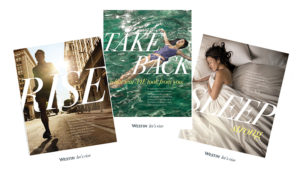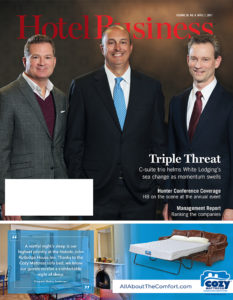BETHESDA, MD—There’s something greater than health and wellness—and that’s well-being. Designed to shape a stress-free environment, Westin is leveraging a new campaign platform to remind travelers there are ways to take back what the passenger in seat 34E—that screaming and kicking four-year-old who spilled juice under the seat—took from them.
While Westin believed it was onto something with its “For a Better You” philosophy, it didn’t want to just push additional functional benefits of programs. “We wanted to be sure that the marketing platform we had was working as hard as it could,” said Brian Povinelli, global brand leader at Westin Hotels & Resorts. Inspired by what’s been going on in the well-being movement holistically, the hotel brand felt it could do a better job of emotionally connecting with its guests.
The first step was to get a fresh perspective. To do this, the hospitality group put out an RFP. San Francisco-based Venables Bell & Partners won the bid and immediately began assisting Westin with the new multifaceted campaign. Together, the two developed and packaged a $30-million, integrated advertising campaign geared toward empowering travelers in a way the hotel company had never done before. The two partners even gave the new campaign platform an uplifting name in the hopes of effectively pitching the well-being initiative: “Let’s Rise.”
“We weren’t changing the brand’s positioning off of well-being,” said Povinelli, who also noted Westin’s desire to be a bit more “aggressive and high profile” with the company’s media choices, as well. “We really just wanted to dial up that emotional connection and be sure the communication vehicles were getting more credit for the actual hotel experience—all the programming we’ve put in place over the years.”
Westin’s well-being program revolves around its six pillars (each of which have several objectives underneath them): sleep well, eat well, move well, feel well, work well and play well. “We were just not feeling that enough people knew about that, and those were real points of differentiation because as more and more companies try to get into the well-being conversation, we felt we really had a holistic experience versus one or two touchpoints a guest may interact with,” he said. Promoting control, the pillars allow guests to pick and choose from options—and that’s where “Let’s Rise” crosses over with Westin’s current programming. “We’ve really tried to ensure that those pillars ladder to this idea of making it more seamless in pursuing your well-being,” Povinelli said, recognizing how everyone views well-being differently.
“Let’s Rise” focuses on the traveler or, more specifically, the traveler’s journey. Control is often taken away from the traveler during a trip: Flights are canceled, trains are delayed and traffic is unpredictable. Conducted by Westin and StudyLogic, a study, based on a survey of nearly 8,000 individuals from six different areas (including North America, Mexico, the United Kingdom, Germany, the United Arab Emirates and China), revealed that more than 50% of the survey’s respondents expect to seek mindfulness opportunities to clear their minds and center themselves during the chaos of travel.
Results of the study also showed that 30% of those surveyed in Germany and more than 20% in UAE believe well-being enables them to feel more in control, while nearly 15% worldwide said well-being reduces stress levels when traveling for business and leisure. “People use well-being as a mechanism to get some control back,” he said, pointing out how people use this method of stress relief in their daily lives as well. “It’s escaping work for a half-hour to go for that run and reset yourself.”
Povinelli added, “We really love that idea and insight, and I don’t think anybody is really tapping into it. At the end of the day, it really is what a lot of our programming does.”
Overall, the campaign itself calls on guests to answer a single question: “Will you get up, or will you rise?” A specific example of how travelers can gain back control is through Westin’s Gear Lending program, a well-being offering in partnership with New Balance. If a guest forgets workout clothing, Westin provides a solution: Guests can rent New Balance shoes and clothing—instead of having travel stressors impacting routine workouts. Another trend surging over the years: tribe workouts. “More and more people seem to be looking to come together and motivate as a unit than as an individual to pursue their well-being, so we liked that idea,” Povinelli said. “That’s really a big part of what’s happening with our customers. How do we capture that and make that relevant to the brand, especially when travel is often an individual experience?” Again, through a partnership with New Balance, Westin developed RunWestin, a way for runners to join a group run led by a property’s Run Concierge. While both programs have been around for a while, they tie directly into Westin’s overall well-being push.
In tandem with the launch of its “Let’s Rise” campaign, Westin began offering its Sleep Well Lavender Balm as an amenity. Westin is in the process of rolling out enhancements to its fitness program, too, layering in a grouping of equipment typically found in local gyms—such as kettlebells, resistance bands and plyo boxes. While Westin finds how it can improve from guest satisfaction surveys, it also reviews third-party research to help shape programs toward growing trends and movements.
The “Let’s Rise” campaign has been in full swing across the United States since January. Westin has plans to rollout the campaign platform throughout the rest of the world in Q2 and Q3.
“This platform, the core premise, we see continuing for several years,” Povinelli said. “We definitely feel this has longevity, and we’ll continue to look for other ways through some of our event activations and other hotel communications to bring that to life.”
Westin also expects to execute an internal associate campaign to reinforce service basics and their role in that, but it will also try to “give them a bit more of a voice and a role in bringing well-being to life, not only in the hotel but in their communities,” he concluded. HB


